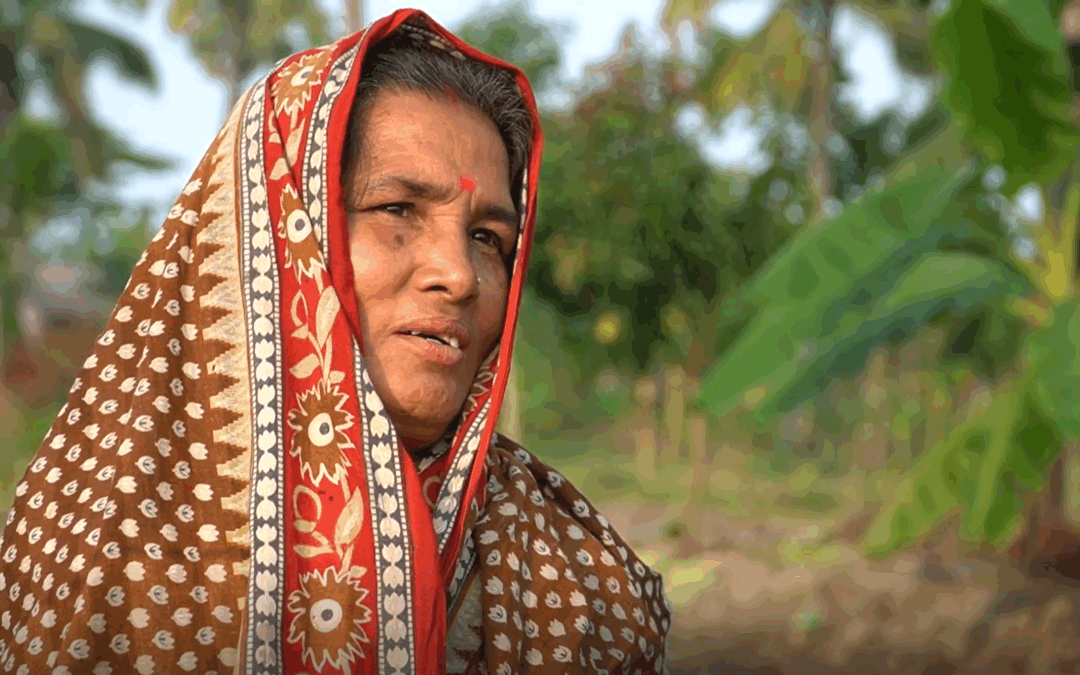
by Shimim Mushsharat | Jun 26, 2025 | Blog, Previous Events, Uncategorized
Jayanti Rani Saha lives in Pratapnagar, Assasuni, one of the climate change hotspots in Bangladesh. She is a housewife, sharing a modest home with her husband and three daughters. Her husband earns just enough to sustain their family of five. But Jayanti’s determination to contribute has turned their yard into a thriving oasis of hope and sustainability.
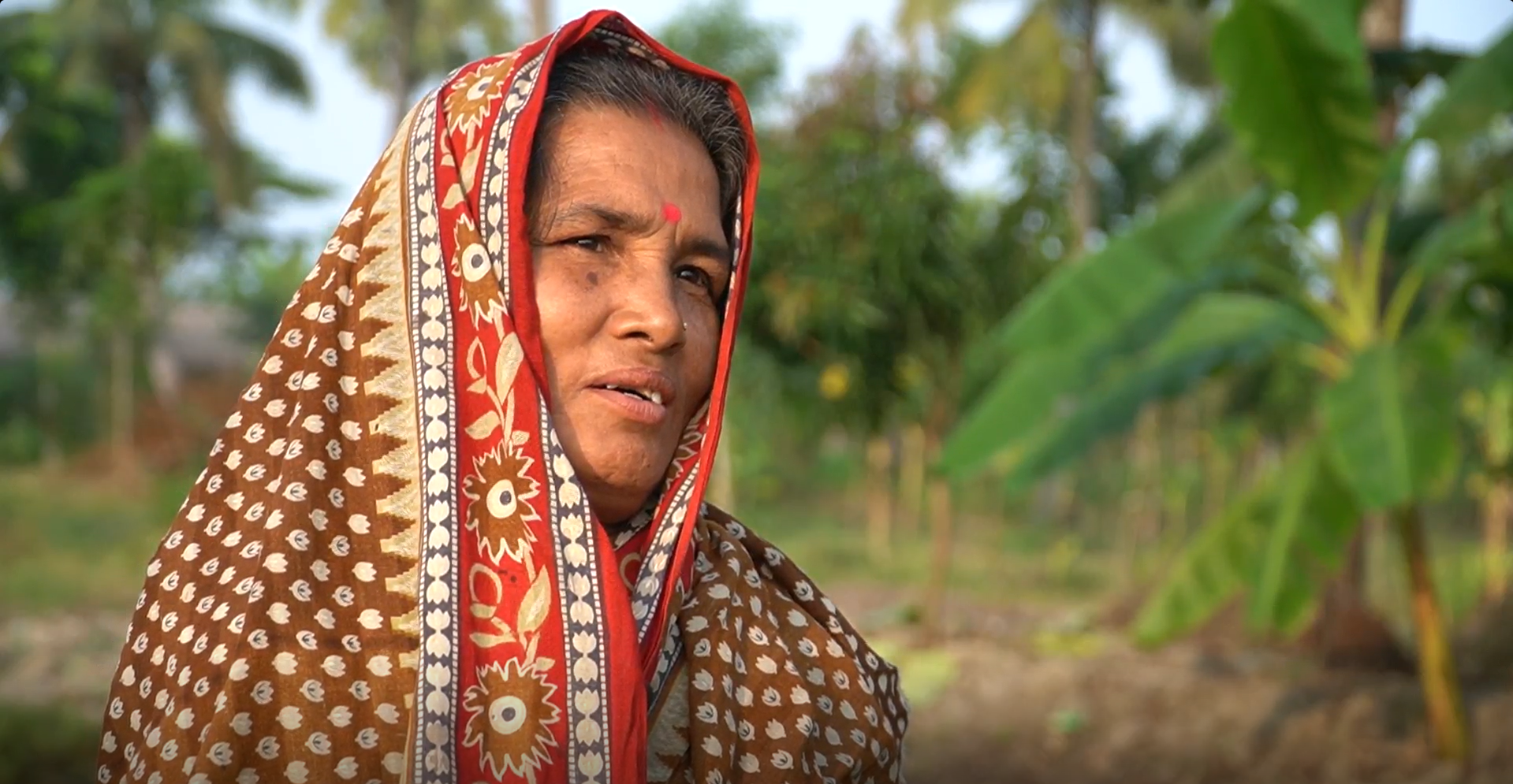
Jayanti is a proud member of a female farmer group supported by SAJIDA Foundation’s ENGAGE4Sundarbans project. This project aims to strengthen social and climate resilience in the Sundarbans delta, an area heavily affected by climate change. Together with her groupmates, Jayanti is currently cultivating beetroot to produce beetroot powder, which contains both nutritional and economic value.
Although Jayanti’s family doesn’t own agricultural land, they have two small ponds where they farm freshwater fish. But Jayanti’s transformation is most visible in her kitchen garden. She nurtures the garden with advice and training from SAJIDA Foundation. Determined to cultivate a healthy and self-sustaining lifestyle, Jayanti has transformed her garden into a diverse ecosystem.
In the winter, she focused on cultivating eggplants along with other vegetables. She crafts natural fertilisers and pesticides from kitchen leftovers, cow dung, and poultry manure instead of using chemicals in her garden. Her reasoning is simple yet profound, “Chemicals harm the insects and animals that are valuable for the environment. And I want my children to eat healthy food.” Her commitment to agroecology is a testament to her intuitive understanding of sustainable living.
“Chemicals harm the insects and animals that are valuable for the environment. And I want my children to eat healthy food.”
— Jayanti Rani Saha, Member of a female farmer group under ENGAGE4Sundarbans Project
Beyond cultivation, Jayanti repurposes household waste into fertiliser, pesticide, and cooking fuel. Cow dung cakes, neatly arranged on a coconut tree trunk in her yard, dry in the sun before being used as eco-friendly fuel. Her forward-thinking approach includes designating one eggplant plant as a seed plant, ensuring her family’s self-reliance in the next planting season. Notably, Jayanti’s garden also blooms with a vibrant scattering of flowers that attract beneficial insects, helps with pollination and also makes the space beautiful.
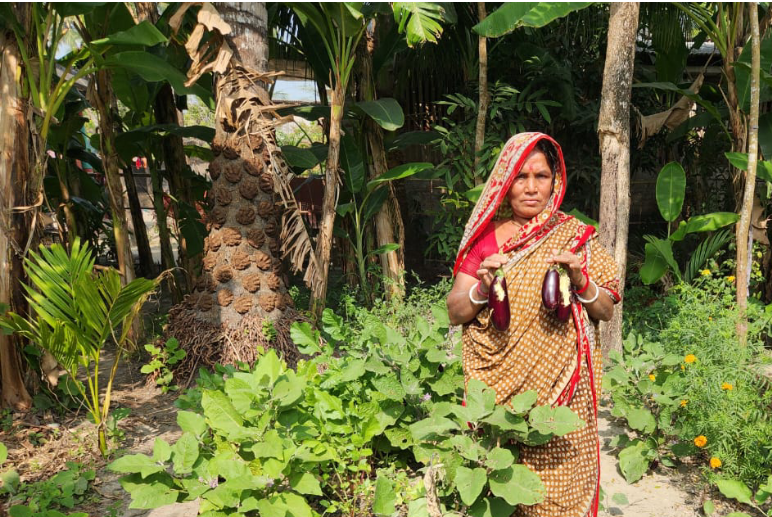
The backdrop to Jayanti’s story is Pratapnagar’s slow recovery from Cyclone Amphan, which devastated the region in 2020. The cyclone triggered prolonged waterlogging, heavy salinity, and the loss of greenery, leaving the land barren. But with the support of SAJIDA Foundation’s ENGAGE4Sundarbans initiative, Jayanti is rebuilding what was lost and creating something greener and more resilient.
Jayanti Rani Saha’s story is a reminder that resilience is about thriving in harmony with the world around us. Her passion, resourcefulness, and commitment to sustainability inspire not only her community but also anyone who dreams of making a difference, no matter how small their resources may seem.
Jayanti Rani Saha is member of a female farmer group under the ENGAGE4Sundarbans Project.
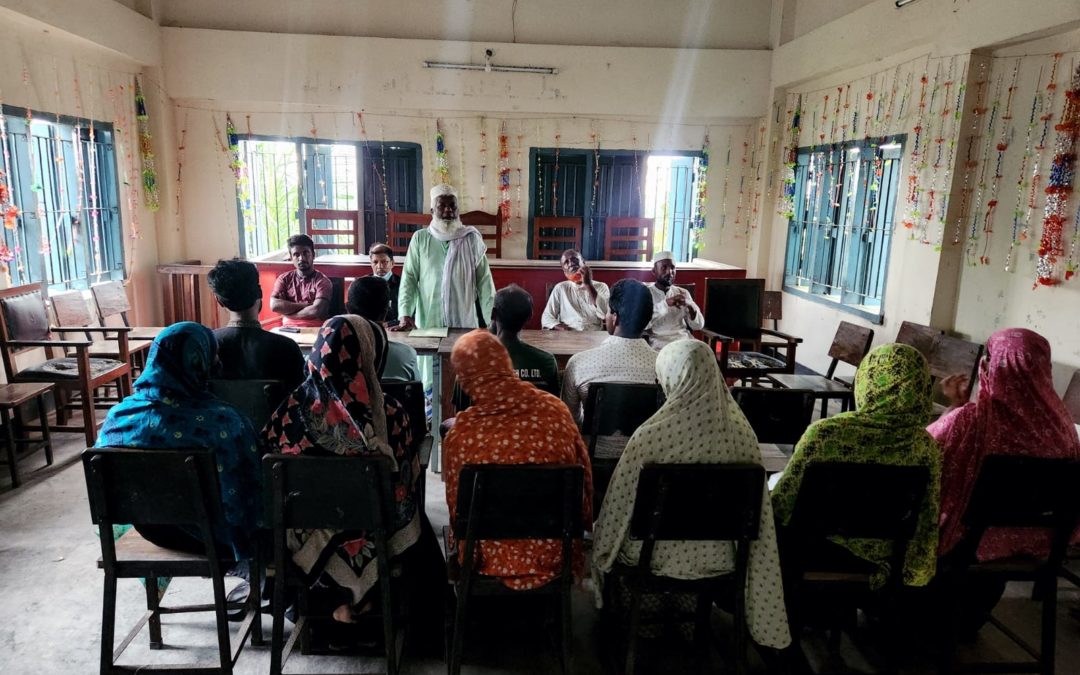
by Shimim Mushsharat | Jun 4, 2025 | Previous Events, Uncategorized
Farmers Share Updates, Experts Offer Guidance
On 1 June 2025, SAJIDA Foundation convened a Local Advisory Committee meeting at the Protapnagar Union Parishad to review agricultural progress and chart the way forward. The gathering brought together Union Chairman Abu Daud Dhali, former Agriculture Officer Mujibur Rahman, journalist Masum Billah, local leaders including market committee president Kamal Hossain, and farmers representing various farmers commons.
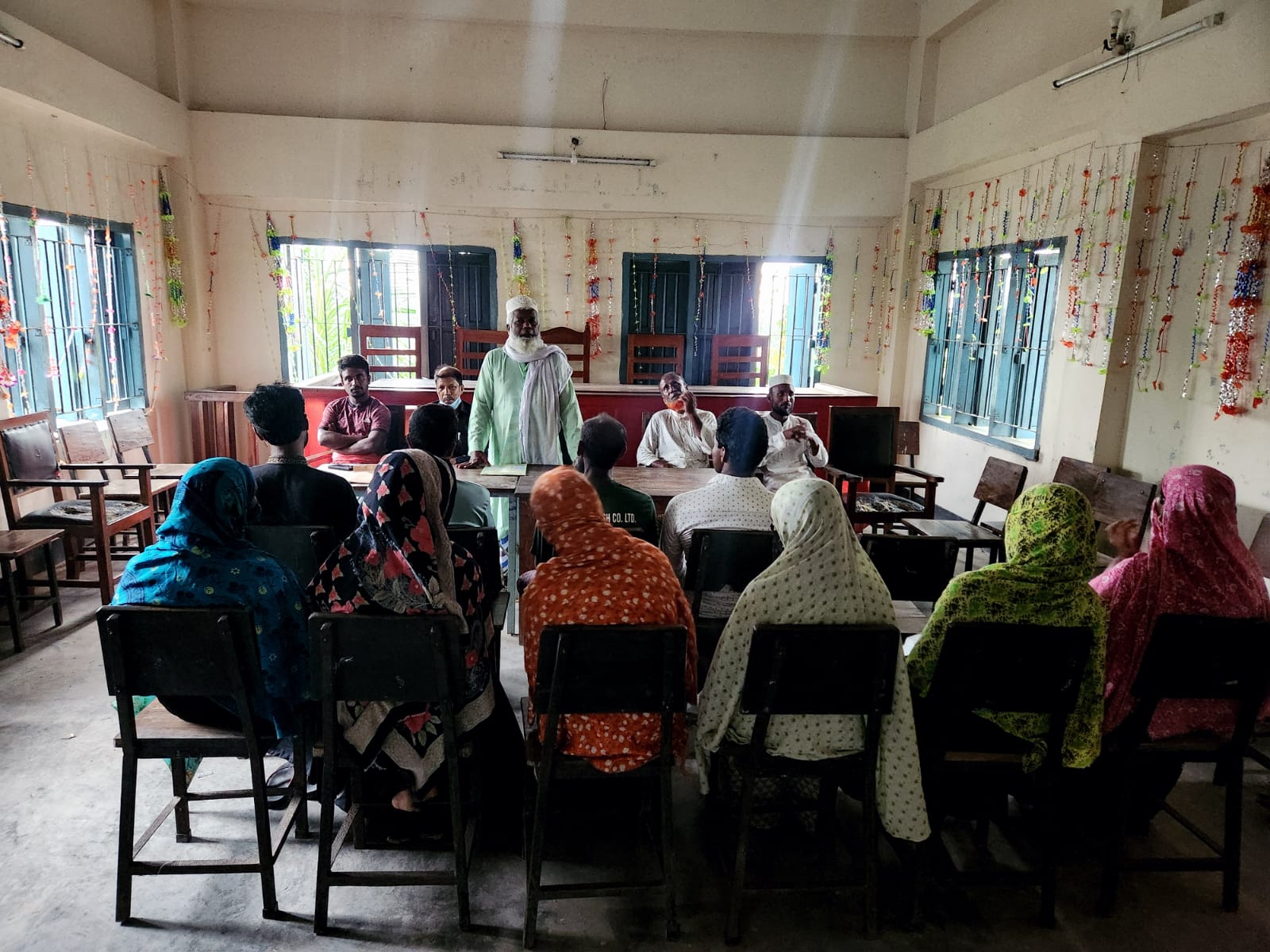
Farmers shared field-level updates, highlighting recent cultivation efforts in mustard, vegetables, sunflower, beetroot, and fennel. While some groups encountered challenges due to high soil salinity, late sowing, and drought conditions, others reported encouraging results. Notably, the women farmers’ group led by Rahima and Jayonti Rani celebrated a successful beetroot harvest, and fennel cultivators reported strong yield.
Providing expert insight, former Agriculture Officer Mr Mujibur Rahman discussed soil test results facilitated by SAJIDA Foundation and offered tailored guidance on fertiliser application. Farmers expressed gratitude for this data-driven support, noting such services were previously inaccessible in the area.
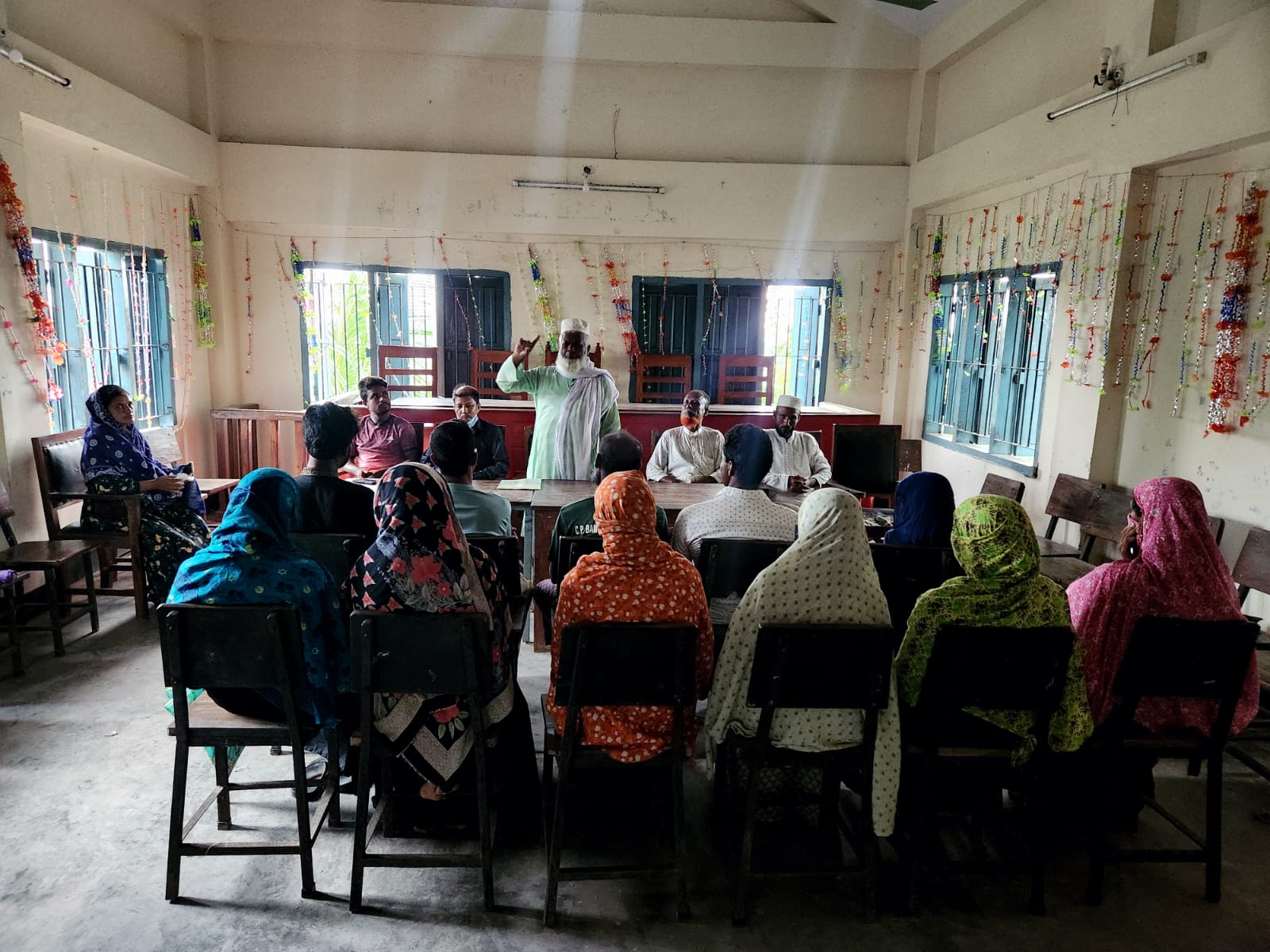
Local agri-input dealer and market committee president Kamal Hossain committed to supporting farmers with high-quality seeds and fertilisers. Chairman Abu Daud Dhali reflected on the region’s long-standing challenges due to saline water intrusion and lauded SAJIDA Foundation’s research-backed interventions—particularly the soil testing initiative. He also advocated for a salt-tolerant tree plantation programme and pledged Union Parishad backing for future ENGAGE initiatives.
The meeting concluded with a discussion on upcoming SAJIDA Foundation activities and a shared commitment to strengthen collaboration among farmers, local stakeholders, and the Foundation.
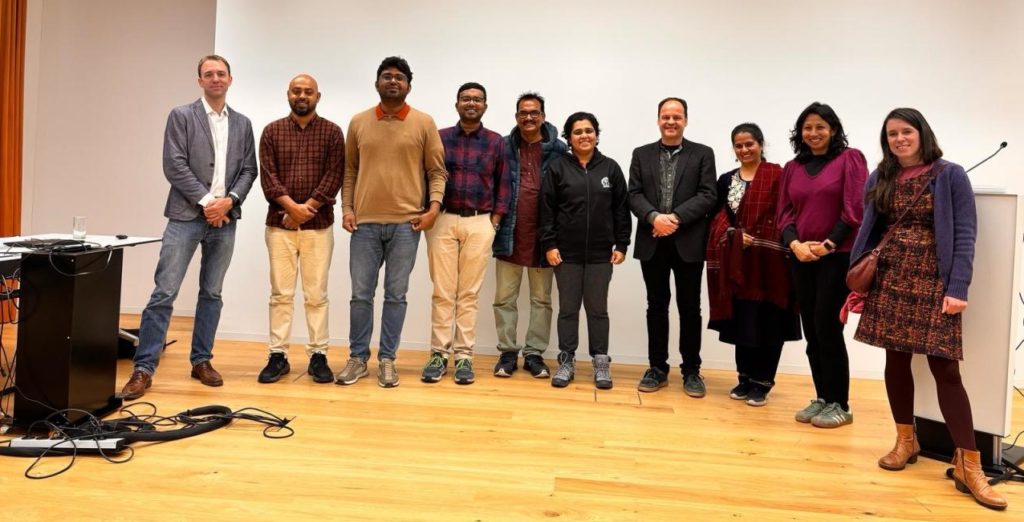
by emilie.cremin@gmail.com | Mar 18, 2025 | Previous Events, Uncategorized
Tuesday 18th of March 2025
12 pm to 1.30 pm: Seminar at SDC (Swiss Agency for Development and Cooperation) in Bern, Eichenweg 5 3003 Bern-Zollikofen
SOR4D Seminar “Resilience in the Sundarbans”
Tuesday 18th of March 2025, 12 pm to 1.30 pm, Room Nil 1, SDC, Eichenweg 5, 3052 Zollikfen

Open event (RSVP)
Contact: Jonathan Demenge: jonathan.demenge@eda.admin.ch Registrations: Lätt Louise louise.laett@eda.admin.ch
The seminar will present the project “Social resilience in the Sundarbans”, ENGAGE4Sundarbans, and will foster an exchange between the public and the research team on the experience and findings on the project and transdisciplinary research supported by SDC and the SNSF through the SOR4D program. The event is open to the public of development practitioners and researchers.
The project aims to enhance the “social resilience” of subsistence farming communities living in rural areas of the Ganges-Brahmaputra delta, on the outskirts of the Sundarbans Forest, a large mangrove forest. The project examines how small-scale farmers in Kumirmari (India) and Pratapnagar (Bangladesh) perceive and experience their social vulnerability and their exposure to multi-hazards such as floods, storm surges and salinisation. Knowledge is built on archival research, household surveys, and ethnographic fieldwork to develop a comparative synthesis of their challenges.
To support these rural communities, the project implements “real-life labs” as experimental spaces to translate knowledge into actionable solutions. These labs explore sustainable fisheries and integrated agroecological market farming, guided by local ecological knowledge and community collaboration. Initial findings reveal that agroecological practices require collective action and institutional support for long-term sustainability. Market access emerges as a significant obstacle for rural communities, necessitating innovative strategies for resource management.
The project proposes leveraging community-managed commons, such as canals and tidal plains, through collective use and governance. By fostering cooperative farming initiatives, the transdisciplinary team, comprising members from India, Bangladesh, and Switzerland, supports the development of community-driven solutions. Ultimately, the creation and management of new commons aim to strengthen social cohesion, promote collective work, and enhance community resilience in this socio-ecologically fragile region.
The SOR4D programme (2022-2030)
The Solution-oriented Research for Development (SOR4D) programme is a joint funding instrument between the Swiss Agency for Development and Cooperation (SDC) and the Swiss National Science Foundation (SNSF) implemented in the “Decade of Action”: that is accelerating efforts towards achieving the Sustainable Development Goals (SDGs) of the 2030 Agenda for Sustainable Development (2030 Agenda). The overarching goal of the SOR4D programme is to produce better knowledge, solutions and innovation by needs-driven, transdisciplinary research that opens up new ways for advancing sustainable development and reducing poverty in the least developed, low and lower-middle-income countries.
Speakers and Research Team
Prof. Dr. Jenia Mukherjee (Principal Investigator, IIT Kharagpur, India)
Jenia, Assistant Professor at the Department of Humanities and Social Sciences (IIT Kharagpur), is a transdisciplinary researcher on water-society relations. Jenia is providing research coordination and outreach support to the Indian team. Apart from her research contributions, her (long-term) agenda is to mobilise research communities and practitioners with the SOR4D-driven action framework through lectures, policy talks, MOOCs, and other policy-relevant, field-oriented outputs (training manuals, user brochures, etc.).
Prof. Dr. Samiya Selim (Principal Investigator, University of Libel Art of Bangladesh, Bangladesh)
Dr. Samiya Selim, Director and Professor, Center for Sustainable Development, University of Liberal Arts Bangladesh specialised in the field of environment conservation, climate change and sustainable development, specifically ecosystem-based management, sustainable livelihoods, socio-ecological systems, climate change adaptation and resilience, ecosystem services, and science-policy interface.
Prof. Dr. Anuradha Choudry (Co-Principal Investigator, IIT Khragpur, India)
Anuradha, Assistant Professor at the Department of Humanities and Social Sciences IIT Kharagpur and Outreach Coordinator at the Indian Knowledge Systems, Division of Ministry of Education, Government of India, is anchored in Sanskrit studies, Psychology, Indic philosophies, and yoga traditions. She conducts and disseminates Indic research and specializes in cultural heritage and community traditions for ecosystem-dependent societies inhabiting vulnerable delta ecologies such as the Chilika and the Sundarbans. In this project, Anuradha experiments with cognitive frameworks to map transitions from community vulnerability to viability in fragile ecosystems.
Mr. Tapas Mandal (Project coordinator, SJSM, India)
Tapas is a proactive community leader with over more than 30 years of experience working on community development and filmmaking, using the medium for grassroots activism and mobilization. His film “Voices of the Sundarbans” (funded by the Global Green Grant Fund in 2018) documents Forest Dependent People of the Sundarban forest in their struggle for survival and their livelihoods and lifeworlds as fishers, farmers, honey collectors and crab collectors.
Mr. Nurul Islam Biplob (Project coordinator, Sajida Foundation, Bangladesh)
Nurul is currently working as lead researcher at the Sajida Foundation, based in Dhaka, Bangladesh. As an anthropologist specializing in climate change, he is deeply passionate about studying the intricate relationship between societies and their environments. Nurul’s primary research interests revolve around climate governance, climate migration, and urbanization.
Mr. Md Faisal Imran (Research collaborator, University of Liberal Art of Bangladesh)
Md Faisal Imran is a development professional working as a Senior Research Associate at the Center for Sustainable Development (CSD), ULAB. He completed his Master’s in Zoology (specialization in fisheries) and his Bachelor’s in Zoology from Jagannath University.
Mr. Souradip Pathak (Research Assistant, PhD candidate, IIT Kharagpur, India)
Souradip Pathak is an institute Doctoral Researcher at the Rekhi Centre of Excellence for the Science of Happiness, IIT Kharagpur. His Doctoral work focuses on ‘Crafting interactive ‘fluid’ governance: Knowledge co-production through multi-stakeholder engagement, reflections from the Indian Sundarbans’ in the context of fishing communities. His area of research interest includes political ecology, human rights, environmental governance and sustainable development goals (SDGs).
Prof. Dr. René Véron (Principal Investigator, University of Lausanne, Switzerland)
René Véron is a professor of social geography at University of Lausanne with primary interests in the field of development studies. His policy-oriented research addresses urban and rural environmental governance issues in the global South with a regional specialization in South Asia, where he has been involved in international collaborations since 1994. For the SOR4D project, René brings expertise on decentralization and rural governance in West Bengal. More recently, he has contributed to the literature on (urban) political ecology, and his research on flood governance in West Bengal and France in Switzerland is directly linked to the SOR4D project.
Dr. Emilie Cremin (Project coordinator, University of Lausanne, Switzerland)
Emilie Cremin is coordinating the project, from the Swiss side. She is a senior researcher, PhD in geography, with training in social, cultural, ethno-ecological and environmental geography. She conducts action research for community engagement in the collective management of river and coastal ecosystems commons and multi-hazard risk assessments and supports communities in developing and implementing collectively built agroecological solutions through integrating local knowledge into environmental policies.
by emilie.cremin@gmail.com | Mar 14, 2024 | Porjects, Uncategorized
MoU 2011 on Transboundary Sundarbans: action-oriented roadmap for ENGAGE
Overview: On September 6, 2011, a Memorandum of Understanding (MoU) was signed between the governments of India and Bangladesh, countries that share the common social ecological landscape of the Sundarbans delta. The MoU was entrusted to the respective ministries of Environment, Forest and Climate Change in the two countries, calling for an adoption of joint management and common principles of conservation. To oversee the MoU’s implementation, a Joint Working Group was established. As a part of the consortium, the Bangladesh-India Sundarban Region Cooperation Initiative (BISRCI) was undertaken in June 2015, to implement a ‘knowledge-based advocacy’, facilitating and supporting effective bilateral cooperation in the region. BISRCI brought together research associations, civil society organizations, think tanks, key members of the strategic community from two countries in order to deliberate on enhancing further cooperation for formation of cross-sectoral platform that will provide actionable plans for management of the delta as well as boost bilateral coordination on Sundarbans.
SOR4D-ENGAGE, a transdisciplinary consortium of three country teams (India, Bangladesh and Switzerland), is motivated to conduct and pursue participatory action research in the transboundary delta with a shared set of objectives and motivation. The project brings together primarily social science researchers, practitioners and user groups, who have long-term experiences on working in delta. The exploratory as well as accommodative approach of the research allows it to deploy archival and ethnographic methods to meticulously explore, map and highlight the physical, political, ecological and social factors mutually operating and driving changes in the transboundary Sundarbans. Through the coupled methodology, a pluri-dimensional realities that have been felt with physical attributes, social demography (migration, assets, livelihoods, gender) and political economy (regulation acts, arrangements, apparatuses, conservation and impacts) in two sides of the common delta, will be sketched, compared and assessed.
ENGAGE acknowledges the MoU as a vital policy template that strategizes mainstream conservation and management of the Sundarbans. Here, we critically read and review MoU articles to understand their current status (from secondary literature) and map the impediments and imperatives to effectuate the provisions, induced by nuanced ‘grounded’ analytics and empirics towards crafting socially resilient trajectories in and for the transboundary delta.
[Note: There are eight articles in the MoU template and among them, three articles (II, III, V) are directly related to the vision and plans of ENGAGE]
|
Article II |
Both Parties, with a view to exploiting the potential of the Sundarbans for development and alleviation of poverty, agree to undertake, but not limited to, the following endeavours: a) consider and adopt appropriate joint management and joint monitoring of resources; b) explore the possibility of implementing conservation and protection efforts, encourage mangrove regeneration, habitat restoration and rehabilitation programs, which would eventually increase the potential for carbon sequestration; c) develop a long term strategy for creating ecotourism opportunities for both countries, which will create synergy and generate greater revenue.
|
| Specific provision |
Current status |
Envisioning ENGAGEment (SOR4D plans and visions) |
| Joint management and monitoring of resources
|
Fragmented, non-systematic and sporadic
|
Ø ENGAGE critically interrogates the mainstream conservation-management-monitoring framework and instead, conforms to the theoretical context of ‘social resilience’. |
| Habitat conservation, mangrove regeneration, habitat restoration and rehabilitation
|
Confined to the protection of designated species and spaces
Climate change impacts are not taken into account
|
Ø The ‘social resilience’ approach and agenda, undertaken by the project, advocates ‘staying’ in the delta pitted against technocratic managed retreat and rehabilitation plans.
Ø ENGAGE is anchored to compile and collate place-based, plural perspectives on climate change-induced risks and resilience to offer solution-oriented ‘pervasive and persuasive pathways’, activating an inclusive governance framework. |
| Ecotourism opportunities
|
Specific needs and priorities need to be identified |
Ø We envision participatory, community-agency based ‘eco-educational tourism’ to simultaneously ensure local socio-economic viability, knowledge exchange and augmentation of research practices (practical-empirical-implementation laboratory attracting field schools and propagating ideas on Environmental Humanities) in the site, rather than following a conventional path that is mostly attracted by business models of outside practitioners or organizations. |
|
Article III |
The Parties are in agreement that the Sundarban ecosystem is greatly influenced by human use and the human beings living around the Sundarban. The Parties will map and delineate these human settlements on respective sides so that a better understanding emerges of the relationship between human settlements and the ecosystems. The Parties will further develop a management plan that utilizes this information to address issues of livelihood, deprivation by flooding and other climate related disasters, man-animal conflict, pollution, resource depletion, etc. The Parties will through the management plan, also identify opportunities for livelihood generation that do not adversely affect the Sundarban ecosystem. |
| Specific provision |
Current status |
Envisioning ENGAGEment (SOR4D plans and visions) |
| Map and delineate human settlements on respective sides
|
Local-level management plans exist but, they are not transformational
|
Ø A detailed exploration and nuanced analyses of multiple interconnected risks, imbricated in the socio-cultural and political-ecological attributes of the region, will pave the way through which ‘situated adaptive practices’ could be collectively identified, mapped and classified.
Ø We would rather be emphasising (trans)local stories of transformation, facilitating knowledge sharing and actions, and envisioning systematic ‘scaling up’ and ‘scaling out’ approaches. |
|
Develop management plans for:
i. Livelihood improvement
ii. Disaster management |
Needs to promote the development of cooperation in fisheries, aquaculture and allied activities between the two countries
Disaster management plans do not include recovery |
Ø Co-identification and co-adoption of solution-focused pilot intervention plan for experimentation on small-scale inland fishing and integrated farming in the translocal project sites.
Ø The project’s impact on knowledge co-creation and livelihoods of stakeholders will be felt in forms of economic stability; socio-cultural belongingness and cohesion; gender empowerment, and improved ecosystem functioning through rejuvenatory practices.
Ø The project’s inclusive approach will allow it to create a comprehensive, practice-oriented knowledge base and facilitate policy outcomes (training guides, knowledge products, digital platforms hosted in policy network) on disaster risk mitigation mechanisms and climate-resilient, gender-neutral livelihood strategies. |
| Article V |
Both Parties will carry out research to develop a common and shared understanding of the impacts of climate change along with adaptation strategies that can be implemented. |
| Specific provision |
Current status |
Envisioning ENGAGEment (SOR4D plans and visions) |
| Develop a common and shared understanding of the impacts of climate change
|
Site-specific knowledge of climate change impacts exists |
Ø By engaging partnerships among and perceptions of multiple groups of actors (academia, development practitioners, policy makers and local communities) across transboundary, transdisciplinary and within translocal contexts, the ENGAGE platform will bring to the fore prominent drivers of climate change, its varied implications and adaptation ‘tactics’ by communities in the delta. |
| Design implementable adaptation strategies |
Small-scale projects have been undertaken without addressing ‘adaptation’
|
Ø The plural understandings of disaster-induced risks and co-mapping of livelihood as well as adaptive practices, will be mobilized, used and shared through local and regional platforms (workshops, seminars, visual presentation, interactions etc.).
|












